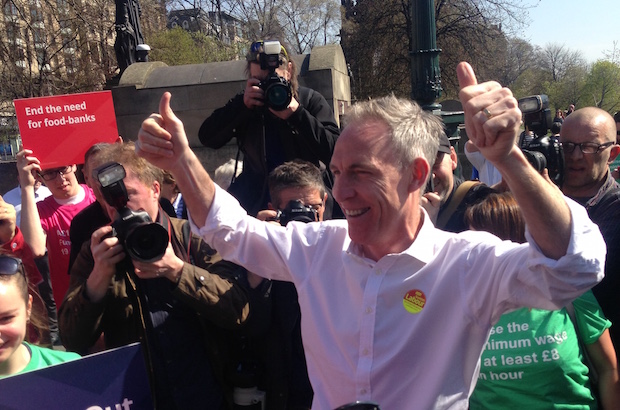Jim Murphy held a street rally in Edinburgh today. Given many of the election events from the main parties have been behind closed doors, the Scottish Labour leader deserves credit for pitching up right outside the Scottish National Gallery and standing for about an hour in a space where real genuine members of the public were walking.

He was, of course, protected by a rubber ring of activists wearing T-shirts with key Scottish Labour pledges on it, such as ending exploitative zero hours contracts and lowering tuition fees. They had placards with #toriesout splashed across them.

And given the rally was secret and only advertised to the media before it happened, there wasn’t much of an opportunity for real genuine members of the public to plan to pop by and ask questions. A few passersby shouted: one called Murphy a ‘fucking bastard’ as he walked to his van parked nearby and another yelled ‘Red Tories out!’ as she crossed the road during another photocall on the steps of the gallery. Given the atmosphere at most sessions of Prime Minister’s Questions in the Commons, that’s pretty tame.
One voter, a friendly sort, came up to me towards the end. ‘Excuse me,’ he asked. ‘Are they talking to people like me or are they in an antiseptic bubble?’ He was annoyed that he had tried to walk towards Murphy for a chat, but had been politely blocked from doing so by a Labourite who had subtly slid in between the man, called Jim, and the other Jim. As we talked, Murphy was posing for a photo with the photographers, who have presumably been following him around for most of this campaign.
So the rally looked more natural than many in this campaign, though sadly the bar is pretty low. This is not exactly people flooding through the doors of a hall to hear a politician speak and persuade them with his or her fine arguments. It is more rallying the troops before they head off to knock on doors. It is still in contrast to the campaign that Nicola Sturgeon is running, examined here by Fraser.

But anyone walking by could have heard Murphy’s speech, which is something. He railed against zero hours contracts, food banks and low wages. He promised to outlaw ‘exploitative zero hours contracts’ (important: this means ‘the zero hours contracts that are exploitative’, rather than ‘zero hours contracts, which are all exploitative’. Some in Labour think the latter is true, but the party’s policy is only the former which is different). He said Labour would abolish the need for food banks (important: this is not possible as even if you weren’t cutting welfare, or at least not cutting welfare in a clunky way, and even if your benefits system paid on time 100 per cent of the time and even if councils had endless hardship funds, there would still be families who had a sudden emergency, an unexpected bill, a crisis, who needed help. Just not as many). And he said Labour would cut tuition fees (important: not a great policy for social mobility, but never mind).
It was a very good, energetic, passionate speech, with a bit of Obama-ish hopey change stuff in it. And by all accounts Labour is running a good campaign in Scotland.
Activists who I spoke to today said they felt this was the best one they’d run, with the best teams helping them. Candidates for re-election feel their ground war is tip top, and the Ashcroft polls back that up: their contact rates with voters on the doorstep are high. ‘The question is whether they’re listening,’ remarked one, nervously.
The only complaint I can find so far is about the way Westminster Labour isn’t necessarily helping out. Scottish MPs were furious when Chuka Umunna said ‘the leader of the Scottish Labour Party will not be in charge of the UK budget’, which allowed the SNP to say Murphy has been ‘hung out to dry’ by his Westminster colleagues. ‘I’m not sure he thinks that was the most unhelpful thing,’ said one Scottish Labour candidate to become an MP again, sourly. ‘He was probably far too busy preening himself.’ But that was just one comment in a long campaign, and Umunna was, perhaps too bluntly, stating the obvious.
The biggest problem is that no matter how good Murphy and his rubber ring of activists are, it all feels a bit late.







Comments